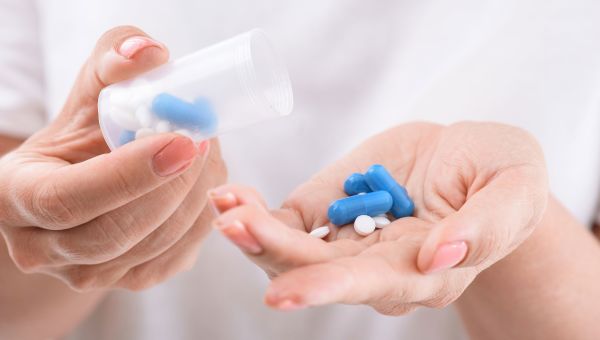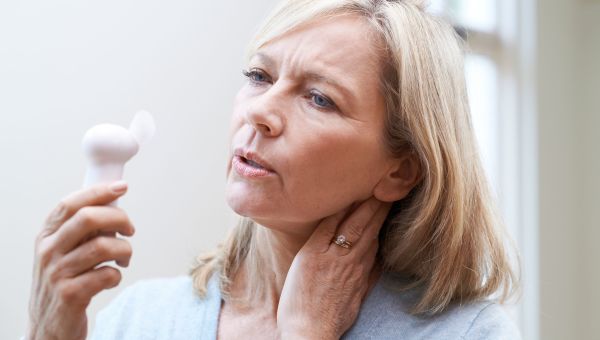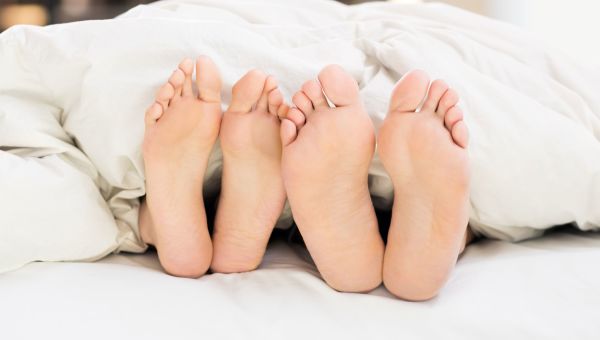One gynecologist gets real about menopause
Here's the low-down on common symptoms—plus how to feel better.
Updated on May 1, 2023

Scientifically speaking, menopause occurs when you go 12 consecutive months without a period. “But the holistic reality of menopause covers the head-to-toe physical, spiritual, and sexual changes that are much more important than the basic definition suggests,” says OBGYN Susan Hardwick-Smith, MD, of Complete Midlife Wellness Center in Houston, Texas.
Menopause can be different for each person experiencing it—some feel empowered from not having to deal with tampons and birth control anymore, while others may experience severe hot flashes, vaginal dryness, and mood changes like irritability, sadness, or feeling overwhelmed. Whatever your personal menopause journey entails, remember that it is a natural transition, and that you can turn to your healthcare providers (HCPs) for help with any symptoms. Here are some important things to keep in mind.

Hormone therapy is safe for most people
If you are experiencing hot flashes, night sweats, insomnia or other symptoms that are affecting your quality of life, talk to your HCP about hormone therapy—it’s a safe option for healthy people (younger than 60 and within 10 years of menopause) who experience moderate to severe symptoms, according to the North American Menopause Society, the American Society for Reproductive Medicine, and the Endocrine Society. If your symptoms are mainly about vaginal dryness or painful sex, your HCP may recommend small doses of vaginal estrogen instead.
If you have a uterus, combined hormone therapy, with progestogen and estrogen, is recommended. And if you’ve had a hysterectomy and no longer have a uterus, estrogen is the only hormone needed.
While these therapies are generally safe, there are some potential risks. Menopausal hormone therapies can increase the risk of blood clots and stroke. The risk is lower among people 59 years and younger and for those using transdermal therapy (patches, gels, and sprays). Combination estrogen and progestogen therapies taken for five years or more may raise the risk for breast cancer, but as soon as the therapy is stopped, the risk is reduced.
If you’re having symptoms that can be controlled by hormone therapy, your gynecologist can discuss other treatments that may be right for you.

Hot flashes are treatable
You may be going about your day when all of a sudden you feel an intense warmth on your face, neck, or chest. Your skin may get blotchy or your heart may start to beat rapidly—you may even sweat through your clothes, especially at night. “I often woke up in a sweat and had to change my sheets and pajamas,” says Hardwick-Smith.
Hot flashes, which are experienced by about 75 percent of people going through menopause, can be very uncomfortable as well as stressful. For most, they last for less than two years, but for some, they can linger for a decade. While they usually improve over time, treatments such as hormone therapy and some types of antidepressant medications are available to provide relief. These lifestyle changes may also help:
- Keep yourself cool. Dress in layers that you can easily take off, carry a fan, and sip on a cold drink if you’re out in the heat or feel a hot flash coming on. At night, lower the thermostat in your bedroom and use light bedding.
- Avoid triggers such as spicy foods, alcohol, cigarettes, and caffeinated beverages.
- Talk to your HCP about a healthy weight loss program. There is some evidence that losing about 10 pounds can help reduce vasomotor symptoms such as hot flashes.
- Some people also find that their symptoms improve when they reduce stress levels with techniques such as mindfulness, meditation and deep breathing exercise.
Talk with your HCP, who can help you figure out what kind of treatment may be right for you.

Brain fog is common
If you find yourself forgetting what you were supposed to pick up at the supermarket or having trouble focusing on a project at work, it could be due to brain fog, which can accompany perimenopause (the period just before menopause), menopause, and the years following menopause. One explanation for these dips in memory and concentration? You’re just not getting enough sleep, thanks to hot flashes, night sweats, and other symptoms brought about by hormonal changes, says Hardwick-Smith. (You may also experience age-related changes in thinking and memory around the same time as menopause.)
“I was only sleeping two to three hours a night, and I couldn’t even remember my own phone number,” says Hardwick-Smith. If you’re concerned about memory issues, talk to your HCP, who can assess whether they’re due to menopause symptoms and can recommend strategies for getting better sleep.
Whether or not you experience brain fog, it’s always a great idea to work on keeping your brain sharp as you age. Research-backed strategies include:
- Engage in stimulating activities like reading, word puzzles, math problems, and painting.
- Get regular exercise and maintain a healthy weight.
- Limit foods high in saturated fat, cholesterol, and trans-fatty acids.
- Make sure you’re getting folic acid, and vitamins B6 and B12 in foods like whole grains, fortified cereal, and leafy greens.
- Quit smoking.
- Avoid alcohol completely or limit your intake to one drink a day.
- Stay socially connected with friends and family.
- Practice healthy sleep habits and aim to get seven to nine hours of sleep per night.

Exercising is more important than ever
Staying physically active through the menopause transition and beyond can improve your mood, your brain, your health, and your symptoms. To get the most benefits, try a routine that combines cardio, strength training, stretching, and posture work. Here’s a guide:
- Cardio workouts to improve your heart health: Whether you prefer the elliptical machine, biking, swimming, dancing, or walking with friends, aim for at least 150 minutes (30 minutes, five days per week) of moderate aerobic activity or 75 minutes (25 minutes, three days per week) of vigorous aerobic activity every week.
- Strength training to help maintain muscle mass and ward off osteoporosis: Work all major muscle groups two to three times a week, including legs, arms, core, and buttocks.
- Posture and core work to improve your balance and ease pain: Add in exercises such as standing on one foot, heel-to-toe walking, or Tai Chi, once or twice a week.
Remember to talk to your HCP before you start any new workout plan.

Aging is an emotional as well as physical journey
Many people find they love the changes that happen in their 40s, 50s, and beyond—you may be more financially stable and able to travel, you may no longer have to worry about becoming pregnant or raising young children, and you may feel more confident in who you are. But there are also midlife realities that can be a little harder to take, says Hardwick-Smith. “Losing your fertility can be really challenging and hard to accept, even if you’ve had your tubes tied or never wanted to have children,” she says. “Your parents will probably need more help than they used to and some of your friends and family may be dealing with chronic health conditions.”
Sometimes, all of these life changes may feel overwhelming, but seeking support is the best medicine. Find a friend or family member who can relate to what you’re going through. You can share your stories and talk through how you handled challenges.
You may also consider therapy to cope with the emotional and life changes that occur during menopause. To find a good therapist, talk with friends to get referrals, see your HCP, or consult a reputable organization such as Mental Health America.

Sex can still be very pleasurable
Many factors influence a person’s sex drive, but waning libido is a natural part of aging for people of all genders.
In menopause, decreasing estrogen and testosterone hormone levels can reduce your desire to have sex, and if you’re exhausted because of lack of sleep, hot flashes and night sweats, you may not exactly be in the most romantic mood when you get into bed. People going through menopause can also experience a thinning and inflammation of the vaginal walls. It occurs when estrogen levels are reduced and can affect libido, due to symptoms like frequent or urgent urination, decreased vaginal lubrication, and discomfort during and after sex.
But if you want to boost your sex drive and your physical enjoyment of sex, there are several ways to do that:
- Communicate with your partner about what feels good to you. Make sure you listen to your partner, too.
- Invite your partner to join you at a gynecology appointment so they can learn more about the changes you’re experiencing.
- Consider talking to a sex therapist.
- Use lubricants for sex or vaginal moisturizers every two or three days as needed.
- Strengthen your pelvic floor muscles with exercises such as Kegels.
- Talk to your partner about your feelings so you’re both on the same page about when and how often you’d like to have intercourse.
Remember: While you can’t get pregnant after your periods have stopped for 12 months in a row, it’s still possible to contract a sexually transmitted infection (STI)—and drier, thinner vaginal walls put you at higher risk because they tear more easily. Prevent STIs by practicing safe sex.

You can use the transition as an opportunity
While menopause brings a lot of physical and mental changes, it can also be an opportunity to focus on yourself. “While we shouldn’t negate the difficult changes that will happen, reframing this time in our life as a real opportunity for awakening can actually be pretty amazing,” says Hardwick-Smith.
“It’s an opportunity to figure out who you really are and what you want from your own heart, not driven by anyone else,” she adds. It can be an opportunity to get involved with charities you’ve always been passionate about or take on a fitness goal you’ve always wanted to achieve, but haven’t had time. And it’s also an opportunity to rekindle your relationship, look for a new one if you’re single, or revel in the joy of being alone.
If you start looking at menopause in this way, she says, “You may find peace with your new self.”

Johns Hopkins Medicine. Introduction to Menopause. Accessed May1, 2023.
Kroenke CH, Caan BJ, Stefanick ML, et al. Effects of a dietary intervention and weight change on vasomotor symptoms in the Women's Health Initiative. Menopause. 2012 Sep;19(9):980-8.
The North American Menopause Society. The Experts do Agree About Hormone Therapy. Page accessed June 24, 2022.
Mayo Clinic. Hot flashes. Page accessed June 6, 2022.
Johns Hopkins Medicine. How Does Menopause Affect My Sleep? Page Accessed June 6, 2022.
MD Anderson Cancer Center. Alcohol and breast cancer risk: What to know. Accessed June 6, 2022.
Mayo Clinic. Fitness tips for menopause: Why fitness counts. March 12, 2021. Accessed June 6, 2022.
Mayo Clinic. Vaginal atrophy. September 17, 2021. Accessed June 6, 2022.
Harvard Health Publishing. Menopause-related hot flashes and night sweats can last for years. August 14, 2020. Accessed June 22, 2022.
The North American Menopause Society. What You Should Know About Memory and Concentration at Midlife. May 2011. Accessed June 22, 2022.
Harvard Health Publishing. 12 ways to keep your brain young. May 13, 2022. Accessed June 22, 2022.
The North American Menopause Society. Fitness After 40: Building the Right Workout for a Better Body. 2022. Accessed June 22, 2022.
The North American Menopause Society. Decreased Desire. 2022. Accessed June 22, 2022.
The North American Menopause Society. Effective Treatments for Sexual Problems. 2022. Accessed June 22, 2022.
The American College of Obstetricians and Gynecologists. The Menopause Years. November 2021. Accessed June 24, 2022.
NIH: National Institute on Aging. Hot Flashes: What Can I Do? September 30, 2021. Accessed June 24, 2022.
Office on Women’s Health. Menopause and your health. February 22, 2021. Accessed June 24, 2022.
More On


video

article


video


video


video
